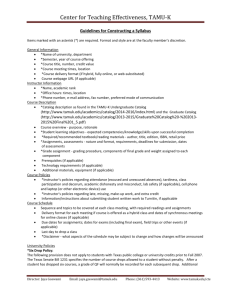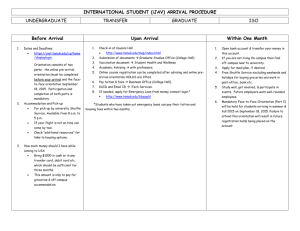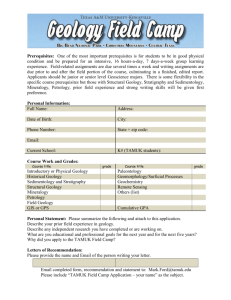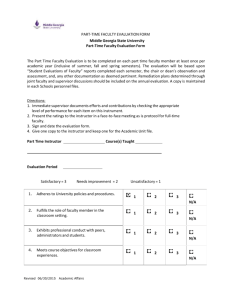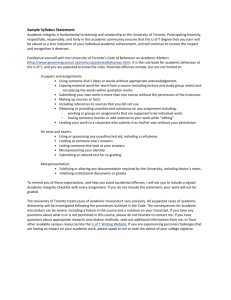Center for Teaching Effectiveness, TAMU-K
advertisement
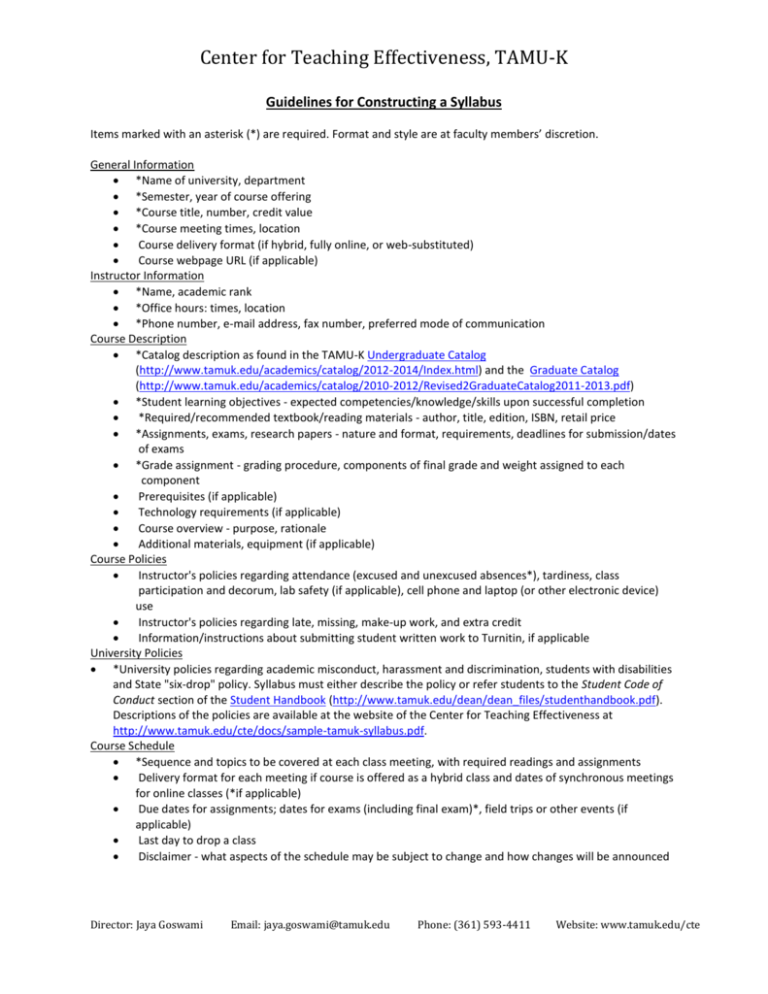
Center for Teaching Effectiveness, TAMU-K Guidelines for Constructing a Syllabus Items marked with an asterisk (*) are required. Format and style are at faculty members’ discretion. General Information *Name of university, department *Semester, year of course offering *Course title, number, credit value *Course meeting times, location Course delivery format (if hybrid, fully online, or web-substituted) Course webpage URL (if applicable) Instructor Information *Name, academic rank *Office hours: times, location *Phone number, e-mail address, fax number, preferred mode of communication Course Description *Catalog description as found in the TAMU-K Undergraduate Catalog (http://www.tamuk.edu/academics/catalog/2012-2014/Index.html) and the Graduate Catalog (http://www.tamuk.edu/academics/catalog/2010-2012/Revised2GraduateCatalog2011-2013.pdf) *Student learning objectives - expected competencies/knowledge/skills upon successful completion *Required/recommended textbook/reading materials - author, title, edition, ISBN, retail price *Assignments, exams, research papers - nature and format, requirements, deadlines for submission/dates of exams *Grade assignment - grading procedure, components of final grade and weight assigned to each component Prerequisites (if applicable) Technology requirements (if applicable) Course overview - purpose, rationale Additional materials, equipment (if applicable) Course Policies Instructor's policies regarding attendance (excused and unexcused absences*), tardiness, class participation and decorum, lab safety (if applicable), cell phone and laptop (or other electronic device) use Instructor's policies regarding late, missing, make-up work, and extra credit Information/instructions about submitting student written work to Turnitin, if applicable University Policies *University policies regarding academic misconduct, harassment and discrimination, students with disabilities and State "six-drop" policy. Syllabus must either describe the policy or refer students to the Student Code of Conduct section of the Student Handbook (http://www.tamuk.edu/dean/dean_files/studenthandbook.pdf). Descriptions of the policies are available at the website of the Center for Teaching Effectiveness at http://www.tamuk.edu/cte/docs/sample-tamuk-syllabus.pdf. Course Schedule *Sequence and topics to be covered at each class meeting, with required readings and assignments Delivery format for each meeting if course is offered as a hybrid class and dates of synchronous meetings for online classes (*if applicable) Due dates for assignments; dates for exams (including final exam)*, field trips or other events (if applicable) Last day to drop a class Disclaimer - what aspects of the schedule may be subject to change and how changes will be announced Director: Jaya Goswami Email: jaya.goswami@tamuk.edu Phone: (361) 593-4411 Website: www.tamuk.edu/cte Center for Teaching Effectiveness, TAMU-K Disability statement: The Americans with Disabilities Act (ADA) is a federal anti-discrimination statute that provides comprehensive civil rights protection for persons with disabilities. Among other things, this legislation requires that all students with disabilities be guaranteed a learning environment that provides for reasonable accommodation of their disability. If you believe you have a disability requiring an accommodation please contact the Disability Resource Center (DRC) as early as possible in the term at (361) 593-2904. DRC is located in the Life Service and Wellness building at 1210 Retama Drive. Academic misconduct statement: You are expected to adhere to the highest academic standards of behavior and personal conduct in this course and all other courses. Students who engage in academic misconduct are subject to university disciplinary procedures. Make sure you are familiar with your Student Handbook, especially the section on academic misconduct, which discusses conduct expectations and academic dishonesty rules. Forms of academic dishonesty: 1) Cheating: Using unauthorized notes or study aids, allowing another party to do one’s work/exam and turning in that work/exam as one’s own; submitting the same or similar work in more than one course without permission from the course instructors; deception in which a student misrepresents that he/she has mastered information on an academic exercise that he/she has not mastered; giving or receiving aid unauthorized by the instructor on assignments or examinations. 2) Aid of academic dishonesty: Intentionally facilitating any act of academic dishonesty. Tampering with grades or taking part in obtaining or distributing any part of a scheduled test. 3) Fabrication: Falsification or creation of data, research or resources, or altering a graded work without the prior consent of the course instructor. 4) Plagiarism: Portrayal of another’s work or ideas as one’s own. Examples include unacknowledged quotation and/or paraphrase of someone else’s words, ideas, or data as one’s own in work submitted for credit. Failure to identify information or essays from the Internet and submitting them as one’s own work also constitutes plagiarism. 5) Lying: Deliberate falsification with the intent to deceive in written or verbal form as it applies to an academic submission. 6) Bribery: Providing, offering or taking rewards in exchange for a grade, an assignment, or the aid of academic dishonesty. 7) Threat: An attempt to intimidate a student, staff or faculty member for the purpose of receiving an unearned grade or in an effort to prevent reporting of an Honor Code violation. Please be aware that the University subscribes to the Turnitin plagiarism detection service. Your paper may be submitted to this service at the discretion of the instructor. Other Forms of Academic Misconduct: 1) Failure to follow published departmental guidelines, professor‘s syllabi, and other posted academic policies in place for the orderly and efficient instruction of classes, including laboratories, and use of academic resources or equipment. 2) Unauthorized possession of examinations, reserved library materials, laboratory materials or other course related materials. 3) Failure to follow the instructor or proctor‘s test-taking instructions, including but not limited to not setting aside notes, books or study guides while the test is in progress, failing to sit in designated locations and/or leaving the classroom/ test site without permission during a test. 4) Prevention of the convening, continuation or orderly conduct of any class, lab or class activity. Engaging in conduct that interferes with or disrupts university teaching, research or class activities such as making loud and distracting noises, repeatedly answering cell phones/text messaging or allowing pagers to beep, exhibiting erratic or irrational behavior, persisting in speaking without being Director: Jaya Goswami Email: jaya.goswami@tamuk.edu Phone: (361) 593-4411 Website: www.tamuk.edu/cte Center for Teaching Effectiveness, TAMU-K recognized, repeatedly leaving and entering the classroom or test site without authorization, and making physical threats or verbal insults to the faculty member, or other students and staff. 5) Falsification of student transcript or other academic records; or unauthorized access to academic computer records. 6) Nondisclosure or misrepresentation in filling out applications or other university records. 7) Any action which may be deemed as unprofessional or inappropriate in the professional community of the discipline being studied. Non-academic misconduct: The university respects the rights of instructors to teach and of students to learn. Maintenance of these rights requires campus conditions that do not impede their exercise. Campus behavior that interferes with these rights will not be tolerated; examples include 1) interfering with the instructor's ability to conduct the class, 2) causing inability of other students to profit from the instructional program, or 3) any interference with the rights of others. An individual engaging in such disruptive behavior may be subject to disciplinary action. Such incidents will be adjudicated by the Dean of Students under non-academic procedures. Ongoing behaviors or single behaviors considered distracting (e.g., coming late to class, performing a repetitive act that is annoying, sleeping or reading a newspaper in class, etc.) will be addressed by the faculty member initially either generally or individually. Cases in which such annoying behavior becomes excessive and the student refuses to respond to the faculty member‘s efforts can be referred to the Dean of Students. In the case of serious disruptive behavior in a classroom the instructor may first request compliance from the student and if it is not received, an instructor has the authority to ask the student to leave the classroom. If the student fails to leave after being directed to do so, assistance may be obtained from other university personnel, including University Police Department. An individual engaging in such disruptive behavior is subject to disciplinary action. Such incidents will be adjudicated by the Dean of Students under non-academic procedures to determine if the student should be allowed to return to the classroom. Harassment /Discrimination: Texas A&M University-Kingsville will investigate all complaints that indicate sexual harassment, harassment, or discrimination may have occurred by the facts given by the complainant. Sexual harassment of anyone at Texas A&M University-Kingsville is unacceptable and will not be tolerated. Any member of the university community violating this policy will be subject to disciplinary action. A person who believes he/she has been the victim of sexual harassment, harassment, or discrimination may pursue either the informal or the formal complaint resolution procedure. A complaint may be initially made to the complainant’s immediate supervisor, a department head, a supervisory employee, the Dean of Students at (361)-593-3606 or the Office of Compliance at (361) 5934758. Regardless of who the complaint is filed with, the Compliance Office will be notified of the complaint so it can be investigated. Six-drop policy: The following provision does not apply to students with Texas public college or university credits prior to Fall 2007. The Texas Senate Bill 1231 specifies the number of course drops allowed to a student without penalty. After a student has dropped six courses, a grade of QF will normally be recorded for each subsequent drop. Additional information on Senate Bill 1231 is available at the Registrar’s Office at (361) 593-2811 and at http://www.tamuk.edu/registrar/drop_policy.html. Director: Jaya Goswami Email: jaya.goswami@tamuk.edu Phone: (361) 593-4411 Website: www.tamuk.edu/cte
